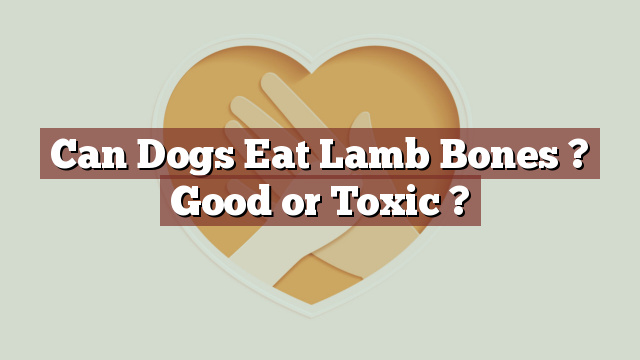Can Dogs Eat Lamb Bones? Good or Toxic?
Knowing what foods are safe for our dogs to eat is crucial for their overall health and well-being. While it’s tempting to share our meals with our furry friends, it’s important to understand that not all human food is safe for dogs. One common question that arises is whether dogs can eat lamb bones. In this article, we will explore the nutritional value of lamb bones, discuss their safety, potential risks and benefits, and provide guidance on what to do if your dog has consumed lamb bones.
Nutritional Value of Lamb Bones: What Do They Offer to Dogs?
Lamb bones are a natural source of essential minerals and nutrients for dogs. They contain calcium, phosphorus, and trace minerals that contribute to healthy bones and teeth. The marrow inside the bones is rich in fat, which can provide a source of energy for your dog. Additionally, chewing on bones can help keep your dog’s teeth clean by reducing plaque and tartar buildup.
Safety of Dogs Eating Lamb Bones: Good or Toxic?
While dogs can eat lamb bones, it is important to note that cooked bones are not safe for them to consume. The cooking process makes the bones more brittle and prone to splintering, which can lead to serious health issues for your dog. These splinters can cause choking, blockages in the digestive system, or even puncture the digestive tract. Therefore, it is crucial to only feed your dog raw lamb bones.
It is also important to consider the size of the bones. Small or thin bones may be easily swallowed or become lodged in the throat, while large bones can cause dental fractures or pose a choking hazard. Always supervise your dog while they are chewing on bones, and remove any small or sharp pieces that may cause harm.
Potential Risks and Benefits of Dogs Consuming Lamb Bones
The potential risks of dogs consuming lamb bones have already been mentioned, including the possibility of choking, intestinal blockages, and injuries to the digestive tract. Additionally, some dogs may have sensitive stomachs and can develop gastrointestinal upset or pancreatitis from consuming bones.
On the other hand, there are potential benefits to allowing your dog to chew on raw lamb bones. Chewing on bones can provide mental stimulation, relieve anxiety, and help alleviate boredom. It can also satisfy a dog’s natural instinct to chew and promote dental health by reducing plaque buildup.
My Dog Ate Lamb Bones: What Should I Do Now?
If your dog has ingested cooked lamb bones or is showing any signs of distress after consuming raw lamb bones, it is vital to seek veterinary assistance immediately. Signs of distress may include choking, difficulty breathing, vomiting, diarrhea, abdominal pain, or lethargy. Prompt medical attention will ensure proper diagnosis and treatment, if necessary.
In Conclusion: Are Lamb Bones Safe for Dogs to Eat?
In conclusion, dogs can safely consume raw lamb bones. These bones offer nutritional benefits and can promote dental health. However, it is crucial to avoid cooked lamb bones as they can splinter and cause serious harm to your dog. Always supervise your dog while they are chewing on bones, choose appropriate-sized bones, and consult with your veterinarian if you have any concerns or questions regarding your dog’s diet and safety. By being knowledgeable about the foods that are safe for our furry companions, we can ensure their well-being and happiness.
Thank you for investing your time in exploring [page_title] on Can-Eat.org. Our goal is to provide readers like you with thorough and reliable information about various dietary topics. Each article, including [page_title], stems from diligent research and a passion for understanding the nuances of our food choices. We believe that knowledge is a vital step towards making informed and healthy decisions. However, while "[page_title]" sheds light on its specific topic, it's crucial to remember that everyone's body reacts differently to foods and dietary changes. What might be beneficial for one person could have different effects on another. Before you consider integrating suggestions or insights from "[page_title]" into your diet, it's always wise to consult with a nutritionist or healthcare professional. Their specialized knowledge ensures that you're making choices best suited to your individual health needs. As you navigate [page_title], be mindful of potential allergies, intolerances, or unique dietary requirements you may have. No singular article can capture the vast diversity of human health, and individualized guidance is invaluable. The content provided in [page_title] serves as a general guide. It is not, by any means, a substitute for personalized medical or nutritional advice. Your health should always be the top priority, and professional guidance is the best path forward. In your journey towards a balanced and nutritious lifestyle, we hope that [page_title] serves as a helpful stepping stone. Remember, informed decisions lead to healthier outcomes. Thank you for trusting Can-Eat.org. Continue exploring, learning, and prioritizing your health. Cheers to a well-informed and healthier future!

